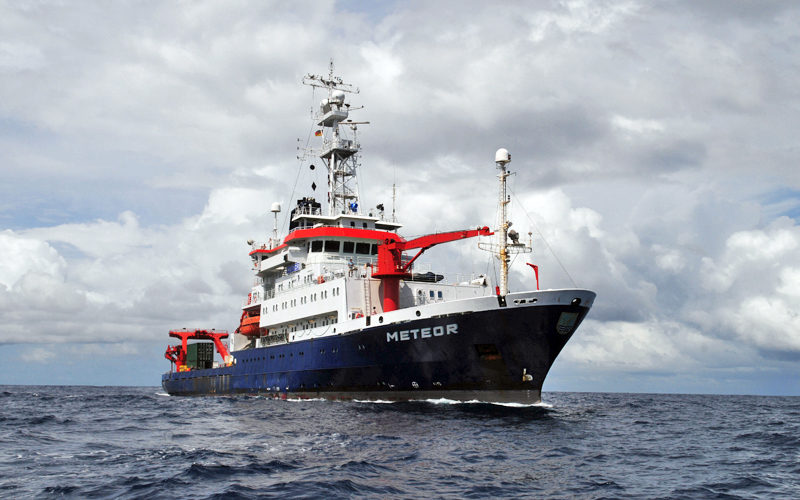METEOR M124
- Area:
- South Atlantic
- Time:
-
29.02.2016 - 18.03.2016
- Institution:
- GEOMAR
- Chief scientist:
- Johannes Karstensen (27 attendees)
The focus of M124 is a cross-basin, lower atmosphere/upper oceanphysical and bio-geochemical survey along approximately 30°S in the sparsely sampled South Atlantic. The survey during M124 aims to: estimate the upper ocean meridional heat and fresh-water transport along approximately 30°S, the physical/biogeochemical characteristics of Agulhas Rings, transporting Indian Ocean Water far into the South Atlantic; aerosols, surface radiation balance, and precipitation measurements; the surface water carbonate system parameters (pCO2). In the Vema channel, our survey will con-tribute to the long term temperature time series.Data will be uploaded into international data bases; a subset of data will be transferred in 6 hours interval to international data centers for rapid distribution. Most observations will be acquired from underway systems, operated during transit of the vessel. Every 4° (about 400km) a mulitnet/CTD rosette station will be done surveying the upper 700 to 1000m depth. The multinet catches will be analyzed under the microscope for planktonic foraminifera abundances and characteristics. Underway sampling is targeted to estimate the hydro-graphic (temperature, salinity) structure of the upper layer. uCTD/RapidCast systems as well as XBTs will be used. The ADCP is used to survey upper layer currents in parallel. The thermosalinograph will be used for continuous recording at one water depth. A towed pump system will deliver water to the ship that is sampled for carbon system parameters and is in parallel surveyed with a new pCO2optode sensor. Organic pollutants (pesticides and other chemicals), mostly originating from atmospheric long range transport, will be analyzed in the surface waters. The same substances will be measured in air based on parallel air sampling. The atmospheric program will focus on the aerosols and clouds using sub photometers and an IR camera. With disdrometersthe precipitation will be quantified, a turbulence measurement system will be used to derive the momentum flux and the heat fluxes.
The expedition will also be used for training purposes, in particular students from South Atlantic bordering countries will participate and will use the data to perform own investigations related to the scientific objectives of the cruise.



